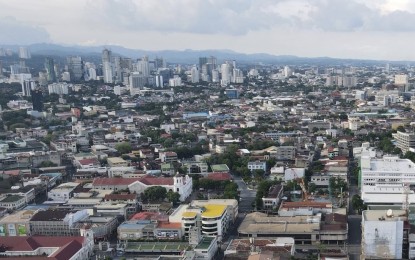
An aerial view of Cebu City's central district. (File photo courtesy of Jun Nagac)
CEBU CITY – Acting Mayor Michael Rama on Thursday said the “Oplan Puyo” (operations plan stay at home) will continue despite the city's shift to general community quarantine (GCQ).
Rama, in a radio interview, said stakeholders recommended a gradual transition in easing restrictions despite the imposition of the less strict GCQ and the downtrend in coronavirus disease 2019 (Covid-19) infections based on the latest data of the Department of Health (DOH) in Central Visayas.
“In our regular meetings of multi-sector Covid-19 task force, the convergence group recommended and proposed the gradual transition to avoid another spike (in Covid-19 infections). We want to achieve a sustained pace towards new normal,” Rama said.
Rama said the Emergency Operations Center (EOC) expressed its support to the proposal to gradually move to more relaxed protocols and reiterated the need to educate residents on the importance of staying at home to prevent further spread of coronavirus, especially the more transmissible Delta variant.
With the Oplan Puyo still operational after Sept. 7, the last day of the modified enhanced community quarantine (MECQ) here, Rama said barangay officials and the local police must work hand in hand in the continued inter-village and intra-village quarantine control points and foot patrol activities.
He said the presence of uniformed police personnel, force multiplier volunteers, and barangay peace officers became a deterrent to residents leaving their homes for non-essential purposes.
“Any person who are under 15 and above 65 and those who suffer immunodeficiency, comorbidity, and other health risks are required to stay at home,” Rama said, stressing that they are only allowed during emergencies or in obtaining essential goods.
He said curfew hours from 10 p.m. to 4 a.m. of the following day should remain in order to sustain the gains in preventing Covid-19 transmission suspected to have occurred in night-time establishments such as bars and restaurants.
Rama said all other restrictions under GCQ as defined by the Inter-Agency Task Force for the Management of Infectious Diseases such as the operational capacities for establishments are still followed under his Executive Order 142 he signed last Tuesday.
As of Wednesday, the city has logged 3,394 active infections with 158 new cases. (PNA)
